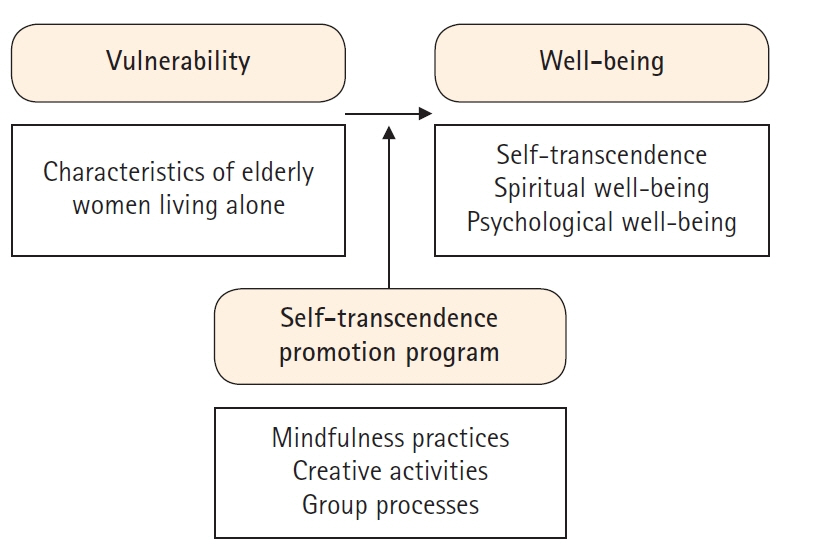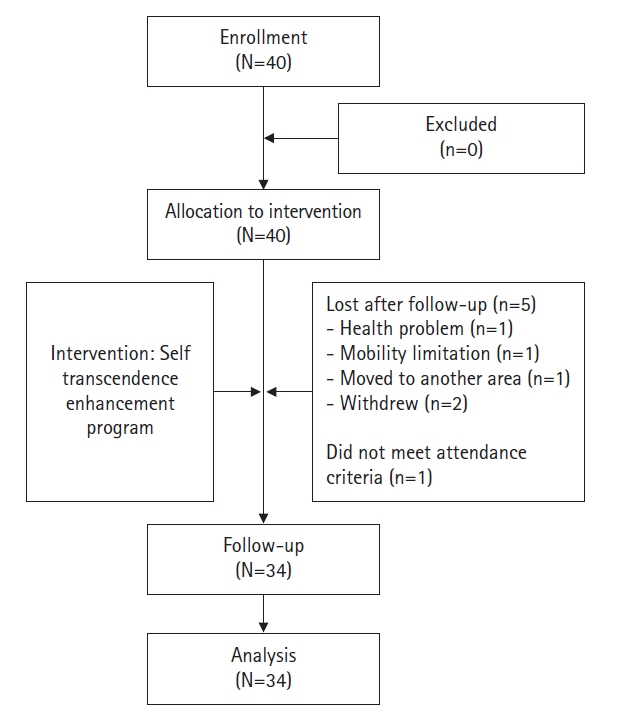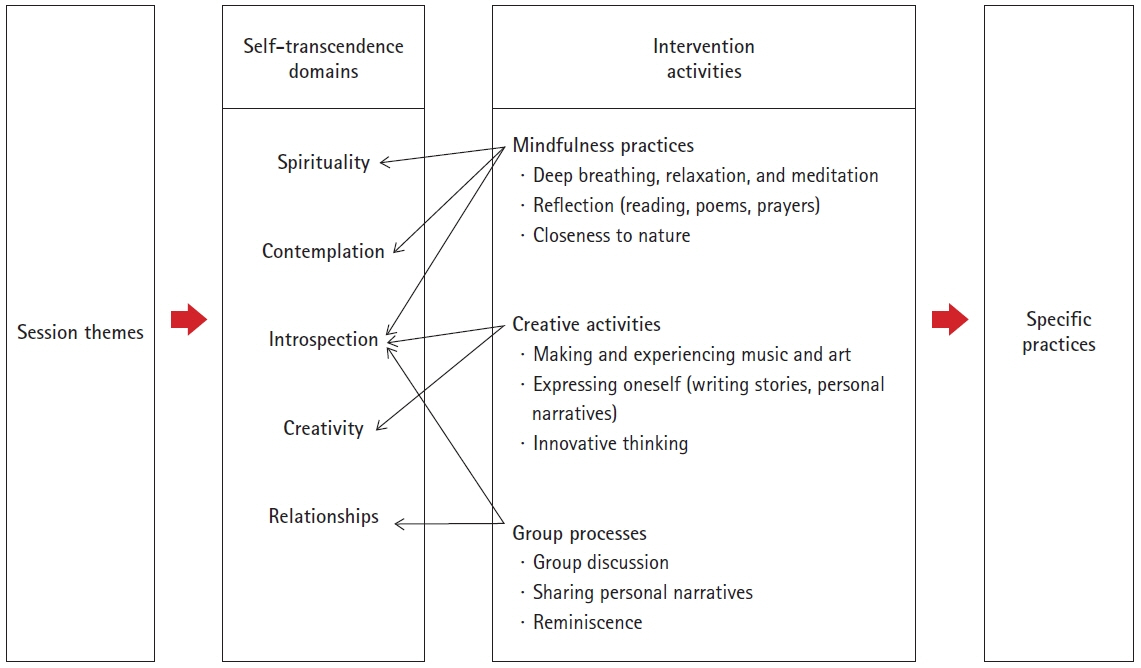Korean J Women Health Nurs.
2021 Jun;27(2):128-140. 10.4069/kjwhn.2021.06.07.
Development and application of a self-transcendence enhancement program for the well-being of elderly women living alone in Korea
- Affiliations
-
- 1Nurse, Chungnam National University Hospital, Daejeon, Korea
- 2College of Nursing, Chungnam National University, Daejeon, Korea
- KMID: 2517570
- DOI: http://doi.org/10.4069/kjwhn.2021.06.07
Abstract
- Purpose
The purpose of this study was to develop a self-transcendence enhancement program and examine its effect on self-transcendence, spiritual well-being, and psychological well-being in elderly women who lived alone.
Methods
A self-transcendence enhancement program was developed through theory, literature review, and in-depth interviews. The theoretical framework came from the Psychoeducational Approach to Transcendence and Health intervention model based on Reed’s mid-range theory of self-transcendence. The program consisted of multiple modalities in a structured, theory-based program lasting for eight weekly sessions. Using a single-group pretest-posttest design, the program was tested on a group of 40 elderly women aged 75 to 84 years who lived alone in Daejeon, South Korea. Participants completed self-reported study questionnaires before and after the program at the elderly welfare center. Data were analyzed using SPSS version 24.0, with significance level set at .05. Paired t-test was used to compare mean differences before and after the program.
Results
The mean age of the study participants was 79.1 years. After completing the program, the participants showed higher levels of self-transcendence (t=8.78, p<.001), overall spiritual well-being (t=8.30, p=.002), religious spiritual well-being (t=1.79, p=.040), existential spiritual well-being (t=6.75, p=.002), and positive affect (t=3.77, p=.001) than they did before the program. They also reported lower levels of depression (t=–7.59, p<.001) and negative affect (t=–6.15, p<.001).
Conclusion
The self-transcendence enhancement program developed in this study may be effective for improving the level of self-transcendence in elderly women living alone and helping them to attain spiritual and psychological well-being.
Figure
Reference
-
References
1. Song EK, Son YJ. Impact of body mass index and perceived health status on depression in elderly women living alone in the community. J Korean Acad Psychiatr Ment Health Nurs. 2011; 20(4):376–385. https://doi.org/10.12934/jkpmhn.2011.20.4.376.
Article2. Lee KJ, Lee E. Factors affecting spiritual well-being in underprivileged older women living alone. J Korean Acad Fundam Nurs. 2011; 18(4):538–546.3. Lee HJ, Um MY. Developing and testing the effects of a group program for the low income depressed elderly women living alone, which integrated positive psychology and solution-focused therapy. Korean J Soc Welfare. 2014; 66(3):101–131. https://doi.org/10.20970/kasw.2014.66.3.005.
Article4. Kim SN, Lee SB. Spiritual well-being, social support, life satisfaction and depression in the community dwelling elderly. J East-West Nurs Res. 2013; 19(2):186–194. https://doi.org/10.14370/jewnr.2013.19.2.186.
Article5. Yoo JY. Study on the multidimensional poverty and determinants of poverty among elderly women living alone. J Korean Soc Wellness. 2020; 15(1):203–221. https://doi.org/10.21097/ksw.2020.02.15.1.203.
Article6. Song YS. Current conditions of single-household elderly women and improvement measures at policy level. Ewha J Gender Law. 2015; 7(2):33–72.7. Jung MS, Kim SJ, Saji V. Effectiveness of forgiveness enhancement program on spiritual well-being and ego integrity of elderly people residing in facilities. Korean J Soc Welf Educ. 2017; 40:135–156.8. Bak MH. Mediating effect of spiritual well-being in the relation between gratitude and depression. J Couns Gospel. 2014; 22(2):184–212. https://doi.org/10.17841/jocag.2014.22.2.184.
Article9. Reed PG. Theory of self-transcendence. In : Smith MJ, Lieher PR, editors. Middle range theory for nursing. 2nd ed. New York: Springer;2008. p. 163–200.10. Hsu YC, Wright CL. The effects of a Socially Supportive Activities Program (SSAP) on mood in long term care: A pilot study. Geriatr Nurs. 2019; 40(6):572–578. https://doi.org/10.1016/j.gerinurse.2019.05.009.
Article11. McCarthy VL, Hall LA, Crawford TN, Connelly J. Facilitating self-transcendence: an intervention to enhance well-being in late life. West J Nurs Res. 2018; 40(6):854–873. https://doi.org/10.1177/0193945917690731.
Article12. Kim SY, Lee JI. Self-transcendence, spiritual well-being, and death anxiety of the elderly. J Korean Public Health Nurs. 2013; 27(3):480–489. https://doi.org/10.5932/jkphn.2013.27.3.480.
Article13. Thomas JC, Burton M, Griffin MT, Fitzpatrick JJ. Self-transcendence, spiritual well-being, and spiritual practices of women with breast cancer. J Holist Nurs. 2010; 28(2):115–122. https://doi.org/10.1177/0898010109358766.
Article14. Song MS, Boo S. The effect of an exercise program for preventing urinary incontinence among community-dwelling elderly females living alone. J Korean Public Health Nurs. 2016; 30(2):247–258. https://doi.org/10.5932/jkphn.2016.30.2.247.
Article15. Baek H, Oh H. A narrative study on the experience of art therapy among elderly women living alone in rural areas. Korean J Art Therapy. 2017; 24(2):577–600. https://doi.org/10.35594/kata.2017.24.2.013.
Article16. Lim JR. Phenomenological research on the experience of melancholy elderly women: focusing on the friend-making program of elderly people living alone. Korean J Gerontol Soc Welfare. 2016; 71(4):9–33. https://doi.org/10.21194/kjgsw.71.4.201612.9.
Article17. Park YR, Sohng KY. Effects of a customized health promotion program on depression, cognitive functioning, and physical health of elderly women living alone in community: a cluster randomized controlled trial. J Korean Acad Nurs. 2019; 49(5):515–525. https://doi.org/10.4040/jkan.2019.49.5.515.
Article18. Yoon HJ, Yu HN. The effects of integrated arts therapy program on old solitary women’s loneliness, self-esteem, personal relationship. J Holist Mind Body Ther. 2015; 2(2):20–38.19. Statistics Korea. National Statistics Portal (KOSIS) statistics table: statistics on registration of elderly living alone in Daejeon Metropolitan City based 2018. Daejeon: Author; c2018 [cited 2018 Aug 20]. Available from: https://kosis.kr/statHtml/statHtml.do?orgId=592&tblId=DT_59201_K001051&vw_cd=MT_ZTITLE&list_id=206_206A_592_59201_K&scrId=&seqNo=&lang_mode=ko&obj_var_id=&itm_id=&conn_path=E1.20. Kim HK, Suh KH. A health psychological qualitative study on the life of urban elderly females living alone. Korean J Health Psychol. 2016; 21(2):431–460. https://doi.org/10.17315/kjhp.2016.21.2.008.
Article21. Jo KH, Lee HJ. Factors related to life satisfaction in young-old, old, and oldest-old women. J Korean Acad Nurs. 2009; 39(1):21–32. http://doi.org/10.4040/jkan.2009.39.1.21.
Article22. Kim Y, Kim SS. Effects of the self transcendence enhancement program among patients with drug addiction: a mixed method research. J Korean Acad Psychiatr Ment Health Nurs. 2017; 26(1):1–13. https://doi.org/10.12934/jkpmhn.2017.26.1.1.
Article23. Elo S, Kyngäs H. The qualitative content analysis process. J Adv Nurs. 2008; 62(1):107–115. https://doi.org/10.1111/j.1365-2648.2007.04569.x.
Article24. McCarthy VL, Ling J, Bowland S, Hall LA, Connelly J. Promoting self-transcendence and well-being in community-dwelling older adults: A pilot study of a psychoeducational intervention. Geriatr Nurs. 2015; 36(6):431–437. https://doi.org/10.1016/j.gerinurse.2015.06.007.
Article25. Reed PG. Self-transcendence and mental health in oldest-old adults. Nurs Res. 1991; 40(1):5–11. https://doi.org/10.1097/00006199-199101000-00002.
Article26. Kim SS, Reed PG, Kang Y, Oh J. Translation and psychometric testing of the Korean Versions of the Spiritual Perspective Scale and the Self-transcendence Scale in Korean elders. J Korean Acad Nurs. 2012; 42(7):974–983. https://doi.org/10.4040/jkan.2012.42.7.974.
Article27. Paloutzian RF, Ellison CW. Loneliness, spiritual well-being and the quality of life. In: Peplau LA, Perlam D, editors. Loneliness: a sourcebook of current theory, research and therapy. New York: John Wiley & Sons; 1982. p. 224-236.28. Lee JH. Validation study of spiritual well-being scale [master’s thesis]. Seoul: Sookmyung Women’s University;2012. 73.29. Ryff CD, Keyes CL. The structure of psychological well-being revisited. J Pers Soc Psychol. 1995; 69(4):719–727. https://doi.org/10.1037//0022-3514.69.4.719.
Article30. Kee BS. A preliminary study for the standardization of geriatric depression scale short form-Korea version. J Korean Neuropsychiatr Assoc. 1996; 35(2):298–307.31. Yesavage JA, Sheikh JI. Geriatric Depression Scale (GDS): recent evidence and development of a shorter version. Clin Gerontol. 1986; 51(1-2):165–173. http://doi.org/10.1300/j018v05n01_09.
Article32. Kwak JH. Relationships of control strategies and participantive well-being: across young, middle, old adulthood [master’s thesis]. Suwon: Ajou University;2003. 36.33. Diener E, Emmons RA, Larsen RJ, Griffin S. The Satisfaction With Life Scale. J Pers Assess. 1985; 49(1):71–75. https://doi.org/10.1207/s15327752jpa4901_13.
Article34. Jeon MA. The relationships of participantive well- being and the exchange of social support in elderly [master’s thesis]. Daegu: Daegu University;2005. 42.35. Watson D, Clark LA, Tellegen A. Development and validation of brief measures of positive and negative affect: the PANAS scales. J Pers Soc Psychol. 1988; 54(6):1063–1070. https://doi.org/10.1037//0022-3514.54.6.1063.
Article36. Des Jarlais DC, Lyles C, Crepaz N; TREND Group. Improving the reporting quality of nonrandomized evaluations of behavioral and public health interventions: the TREND statement. Am J Public Health. 2004; 94(3):361–366. https://doi.org/10.2105/ajph.94.3.361.
Article37. Song MS, Kim NC. Spiritual well-being, spiritual needs and depression among community-dwelling Korean elders. J Korean Gerontol Nurs. 2011; 13(1):29–36.38. Lee SE, Kim BH. Predictors of depression in community dwelling older women living alone. J Korean Gerontol Nurs. 2016; 18(1):1–11. https://doi.org/10.17079/jkgn.2016.18.1.1.
Article39. Min JB. The effect of spiritual well-being on the elderly’s quality of life: focused on the mediating effect of death anxiety and depression. Theology Praxis. 2018; 61:411–441. https://doi.org/10.14387/jkspth.2018.61.411.
Article40. Kim ML. Grief of loss and subjective well-being among the elderly participating in regular exercise. J Korean Phys Educ Assoc Girls Women. 2009; 23(3):75–87.41. Seok J, Jang E. The effect of social relationship resource by gender on the life satisfaction of elderly living alone. Korean J Gerontol Soc Welfare. 2016; 71(2):321–349. https://doi.org/10.21194/kjgsw.71.2.201606.321.
Article
- Full Text Links
- Actions
-
Cited
- CITED
-
- Close
- Share
- Similar articles
-
- A Qualitative Study on the Self-Transcendence Experience of Middle-aged Working Women Participating in Self-transcendence and Health Program
- Effects of the Self-transcendence Enhancement Program among Patients with Drug Addiction: A Mixed Method Research
- Dietary Behaviors and Seasonal Diversity of Food Intakes of Elderly Women Living Alone as Compared to Those Living with Family in Gyeongbuk Rural Area
- A Study on the Perceived Health Status, Depression, and Activities of Daily Living for the Elderly in Urban Areas
- Predictors of Successful Aging in Korean Older Women Based on Successful Aging Theory (SAT)




